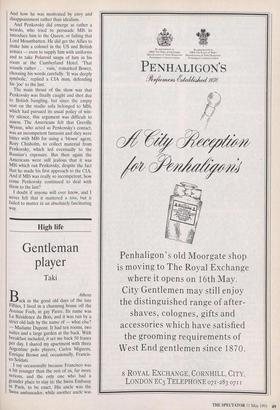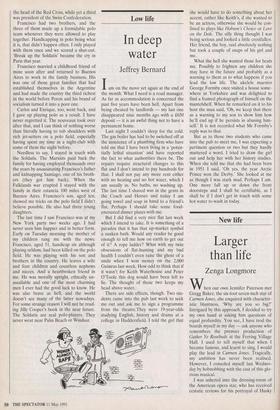High life
Gentleman player
Taki ack in the good old days of the late Fifties, I lived in a charming house off the Avenue Foch, in gay Paree. Its name was La Residence du Bois, and it was run by a strict old lady by the name of — what else? Madame Dupont. It had ten rooms, two suites and a large garden at the back. With breakfast included, it set me back 50 francs per day. I shared my apartment with three Argentine polo players, Carlos Miguens, Enrique Brown and, occasionally, Francis- co Soldati.
I say occasionally because Francisco was a bit younger than the rest of us, far more serious, and the only one who had a grander place to stay in: the Swiss Embassy In Paris, to be exact. His uncle was the Swiss ambassador, while another uncle was the head of the Red Cross, while yet a third was president of the Swiss Confederation.
Francisco had two brothers, and the three of them made up a formidable polo team whenever they were allowed to play together. Handicapping in polo being what it is, that didn't happen often. I only played with them once and we scored a shut-out. `Break up the Soldatis' became the cry in Paris that year.
Francisco married a childhood friend of mine soon after and returned to Buenos Aires to work in the family business. His was one of those great families that had established themselves in the Argentine and had made the country the third richest in the world before Peron and his brand of socialism turned it into a poor one.
Carlos and Enrique, too, went back, and I gave up playing polo as a result. I have never regretted it. The nouveaux took over after that, and I can think of nothing worse than literally having to rub shoulders with rich jet-setters on a polo field, especially having spent my time in a night-club with some of them the night before.
Needless to say, I stayed in touch with the Soldatis. The Marxists paid back the family for having employed thousands over the years by assassinating Francisco's father and kidnapping Santiago, one of his broth- ers (they got him back). When the Falklands war erupted I stayed with the family in their estancia 100 miles west of Buenos Aires. Francisco's son, aged ten, showed me tricks on the polo field I didn't believe possible. He also had three young daughters.
The last time I saw Francisco was at my New York party two weeks ago. I had never seen him happier and in better form. Early on Tuesday morning the mother of my children rang me with the news: Francisco, aged 51, handicap six although playing seldom, had been killed on the polo field. He was playing with his son and brothers in the country. He leaves a wife and four children and countless nephews and nieces. And a heartbroken friend in me. He was morally upright, ethically un- assailable and one of the most charming men I ever had the good luck to know. He was also brave as hell, and the world doesn't see many of the latter nowadays. For some strange reason I will not be read- ing Jilly Cooper's book in the near future. The Soldatis are real polo-players. They never went near Palm Beach or Windsor.



























































 Previous page
Previous page